View cart “Dry Coconut” has been added to your cart.
Pooja Shawl
₹380.00
Description
- Shawls are used in order to keep warm, to complement a costume, and for symbolic reasons. Shawls are also used for draping on the body during religious ceremonies.
- Made of soft cotton
- Shawl can be worn by pilgrims during their pilgrimage visit like Tirupati Balaji, Sabrimala, Sangam, the confluence of the rivers Ganges, Yamuna and Saraswati, at the Kumbha Mela.
Categories: Pooja Clothes, Pooja Ingrediants
Related products
Brass Kalash (Small)
₹350.00
Description
- This lovely Kalash can be utilized karwa chauth and any event like wedding , commitment ,diwali , raksha bandhan or in any ceremonies, puja Brass Kalash keeps up an exceptionally propitious job as it is a piece of each religious customs.
- This is made of Brass material which makes it durable.
- Kalash is an important accompaniment in pooja rituals, weddings and important festive occasions.
- The water in Kalash is also used during abhishekam.
- Made in heavy shining brass.
Specifications
- Material - Brass
- Pack of - 1
- Size - (W x H) 6 x 6.5 cm
- Weight - 66 g
Supari / Betelnut
₹105.00
Description
- The betel nut/Supari is an integral part of the daily or ritualistic Pooja.
- It is also popularly used in the age old-custom of Indian eating.
- The supari is symbolic of the nut of the ego that must be offered on the altar of God.
- It represents the hard, coarse qualities that must be surrendered to God, leaving only the soft, pure qualities.
- Mostly symbolic, the Supari is many a times traditionally represented as the Nine planets (in the Navgrah Pooja) and takes the form of Deities like Brahma, Surya and others during different Pooja.
Quantity
- 11 pieces
Yellow Mustard (Pili Sarso)
₹50.00
Brass Panchaarti (Small)
₹660.00
Description
- The importance of lighting a diya during worship can be traced back to Vedas.
- Light symbolizes knowledge and darkness, ignorance.
- The Lord is the “Knowledge Principle” (chaitanya) who is the source, the enlivener and the illuminator of all knowledge.
- Hence light is worshipped as the Lord Himself. Knowledge removes ignorance just as light removes darkness.
- Also knowledge is a lasting inner wealth by which all outer achievements can be accomplished.
- Hence we light the lamp to bow down to knowledge as the greatest of all forms of wealth.
- We therefore keep a lamp lit during all auspicious occasions as a witness to our thoughts and actions.
Specifications
- Material – Brass
- Pack of – 1
- Weight – 245 g
Chandan Powder
₹150.00
Description
- Chandan or sandal is well known for its aroma and cooling effect on human body.
- Sandal powder is an important pooja item.
- Sandal paste is used in worshiping deities especially for applying tilak on the forehead of sacred idols.
- After offering to deities, devotees can apply it between the eyebrows or on the forehead to cool the nervous system and to stimulate spiritual energy.
- The paste can help heal skin diseases such as infectious sores, ulcers, acne and rashes.
- Sandalwood powder helps smooth and cool the skin, and can be made into a paste, lotion or soap for cleansing, calming and hydrating sensitive or aging skin.
- Sandalwood balances the circulatory, digestive, respiratory and nervous systems.
Quantity
- 20 gms
Copper Panchapatra
₹210.00
Description
- copper panchpatra is an integral part of poojas where in the holy charan amrit is placed before the pooja and then distributed upon the Pooja's completion.
- The Charanamrit literally means Amrit (Holy Nectar) from the Charan (Feet of the Lord) of the worshipped deity and is partaken as a sacred offering or a holy gift after the completion of the pooja.
- In many Hindu homes the cooked food is first offered to the Lord each day and is then consumed by everyone else.
- The offered food is mixed with the rest of the food and then served as prasad.
Specifications
- Material - Copper
- Pack of - 1
- Size - (W x H) 7 x 6 cm
- Weight - 33 g
- Capacity - 100 ml
Turmeric Powder (Haldi)
₹30.00 – ₹55.00
Description
- Turmeric is considered highly auspicious in India and has been used extensively in various Indian ceremonies for millennia.
- Even today it is used in every part of India during wedding ceremonies and religious ceremonies
- Turmeric has played an important role in both Buddhist and Hindu spiritualism. The robes of the Buddhist monks were traditionally colored with a yellow dye made of turmeric.
- It is used in pooja to make a form of Lord Ganesha.
- Ganesha, the remover of obstacles, is invoked at the beginning of almost any ceremony and a form of Ganesha for this purpose is made by mixing turmeric with water and forming it into a cone-like shape.
- It is offered to Gods during pooja.
Quantity
- 50 gms , 100 gms
Cooper Plain Kalash
₹650.00
Description
- The Kalash symbolically represents creation. The vacant pot, symbolizes earth, and the water filled symbolizes the primordial water from which life began on earth.
- It is filled with water (preferably the water of holy Ganga, any sacred river or clean, running water).
- Its top open end holds betel or mango leaves and a red-yellow sanctified thread (kalawa or mauli) is tied around its neck.
- This kalash is placed on the pujavedi (worship dais or table) near the idols or pictures of the deity. It is placed facing the North, in the center.
- This positioning signifies balance; balance that one needs to achieve success in every walk of life.
- Often it is topped by a coconut or a deepak and kept on the sacred Vedic swastika symbol or a Vedic swastika is drawn on it by using wet vermillion, sandal-wood powder and turmeric.
Specifications
- Material: Copper
- Pack of - 1
- Size - (Top W x H): 8.5 x 9 cm
- Weight - 118 g


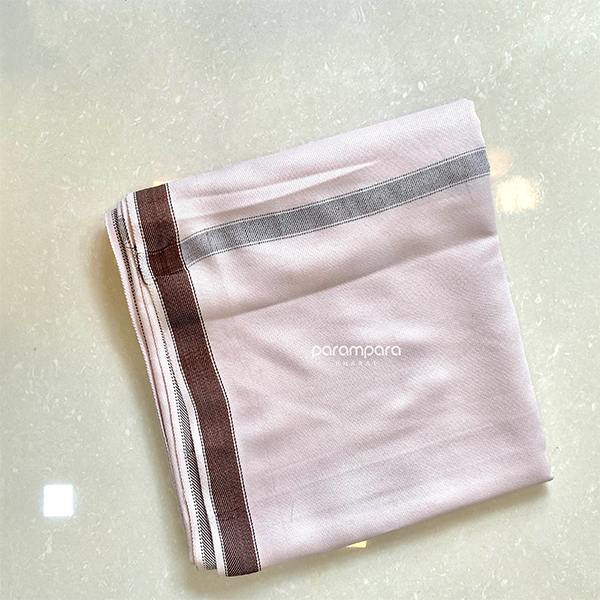
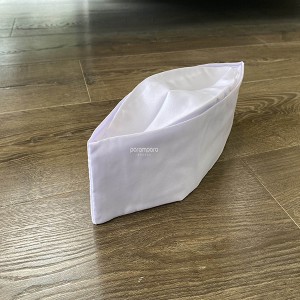

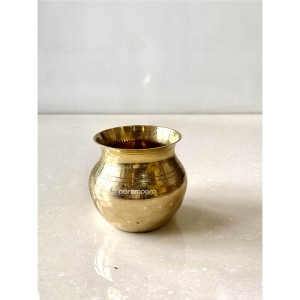
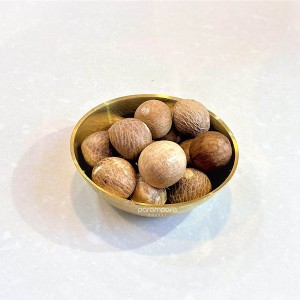
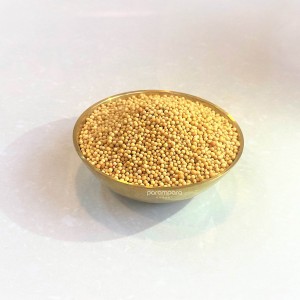

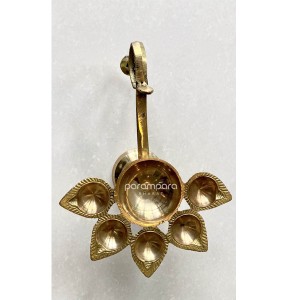

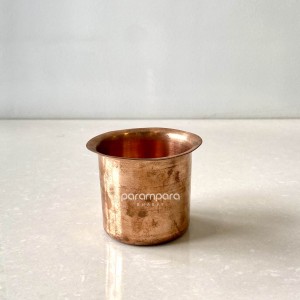
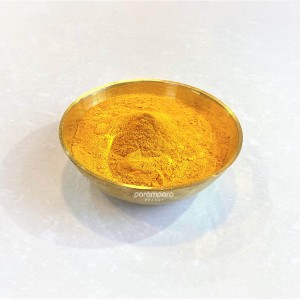
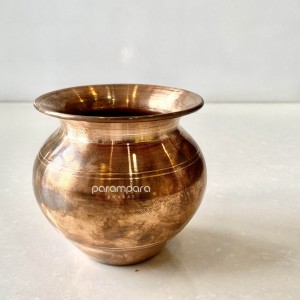


Reviews
There are no reviews yet.